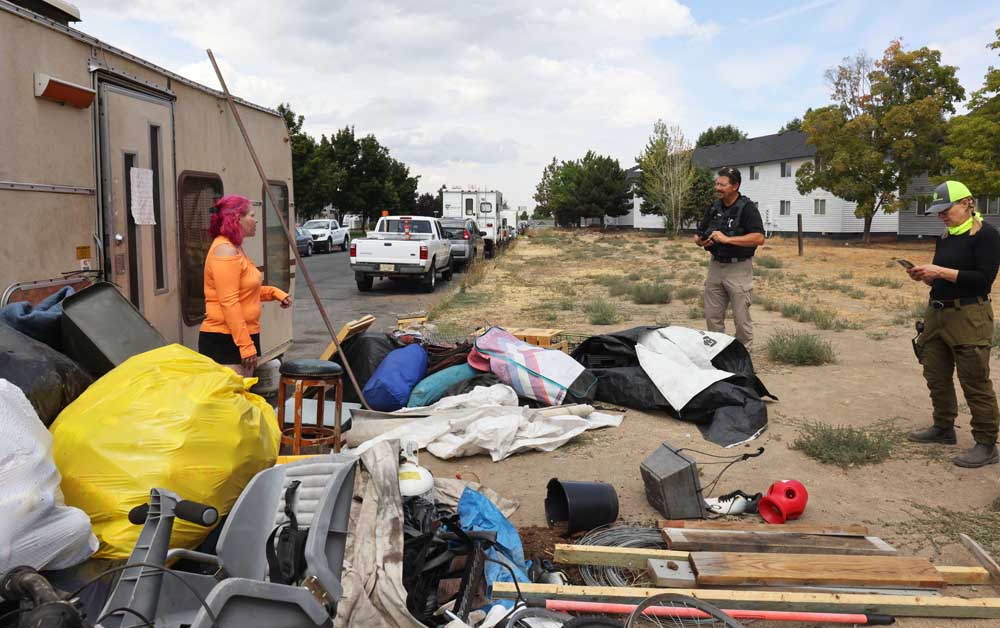Guest Column: Changing car camping code in Bend is bad policy
Published 6:00 am Friday, September 6, 2024

- Tiffini Prater, left, speaks with Bend health and safety officers Jason Gault and Sherri Meisel about the process of moving from NE Watt Way in Bend.
At the upcoming Bend city council meeting, councilors will hear suggestions from the city attorney’s office to cut the amount of time someone on Bend’s streets can stay or sleep in their vehicle from three days to 24 hours.
As a longtime homeless advocate in Bend who assists unhoused persons living in tents or vehicles relocate to other areas after receiving notice to move from the city, I think it is a bad idea. The service providers I coordinate with also think this is a bad idea.
It is the time provisions at issue. The place restrictions — within 1,000 feet of shelters and near residential uses and no more than three per block — are reasonable.
But the idea to cut from three days to 24 hours appears to be in direct violation with the city’s own official policy.
The city’s homeless response policy reads: “The city of Bend acknowledges that it is currently unavoidable that some people will live or shelter for survival outdoors until they are able to access affordable or free shelter or housing. In Bend, this has typically meant sheltering, sometimes for extended periods of time, on city rights-of-way and city property … ”
How can the city square its own official policy recognizing that it is sometimes necessary for someone to shelter on city streets for extended periods of time with now arbitrarily saying that the extended period of time can only be 24 hours?
The city’s current camping code says someone tent camping can be there 24 hours but then must move a defined distance away. But survival sheltering in a vehicle is different from being in a tent.
Speaking from experience, having helped unhoused people move their tents and belongings after receiving a city notice to move, I can readily say a tent can be moved in 24 hours — but a vehicle often can’t.
The city’s apparent assumption is that vehicles being used for survival shelter are either running or capable of being moved quickly. Vehicles of the unhoused, if a car or an RV, tend not be running, out of gas or both.
Typically, homeless occupants of trailers have no other vehicle, no way of locating someone with a running vehicle capable of towing their rig. And even if they could, they have no way of paying for it and no place to move it to — other than another city street location from which they will be forced away within days, simply repeating the cycle.
The city’s proposed change from three days to 24 hours also puts service providers at a serious disadvantage.
Service providers are the city’s first line of defense in protecting the public health, safety and welfare of the unhoused sheltering in tents or survival sheltering in vehicles. Service providers know the medical and welfare needs of the people they work with and are helping them get their needs met.
Thus, service providers are also the first line of defense for Bend’s housed citizens and its business community.
But service providers who suddenly find their client missing from the location where they had last been, must then try and track the person down and try and get them re-engaged in services while they also deal with the additional trauma the person has just experienced from being displaced yet again.
It makes the work of the service providers much harder, placing more burden on them that they simply don’t need. There’s no immediate crisis that requires hurry-up action by the city to change the vehicle policy. The Watt Way situation that appears to have spurred the city to action is now resolved.
So let’s keep the status quo for the time being and get service providers, the city and interested citizens together to work this out.
Do you have a point you’d like to make or an issue you feel strongly about? Submit a letter to the editor or a guest column.








